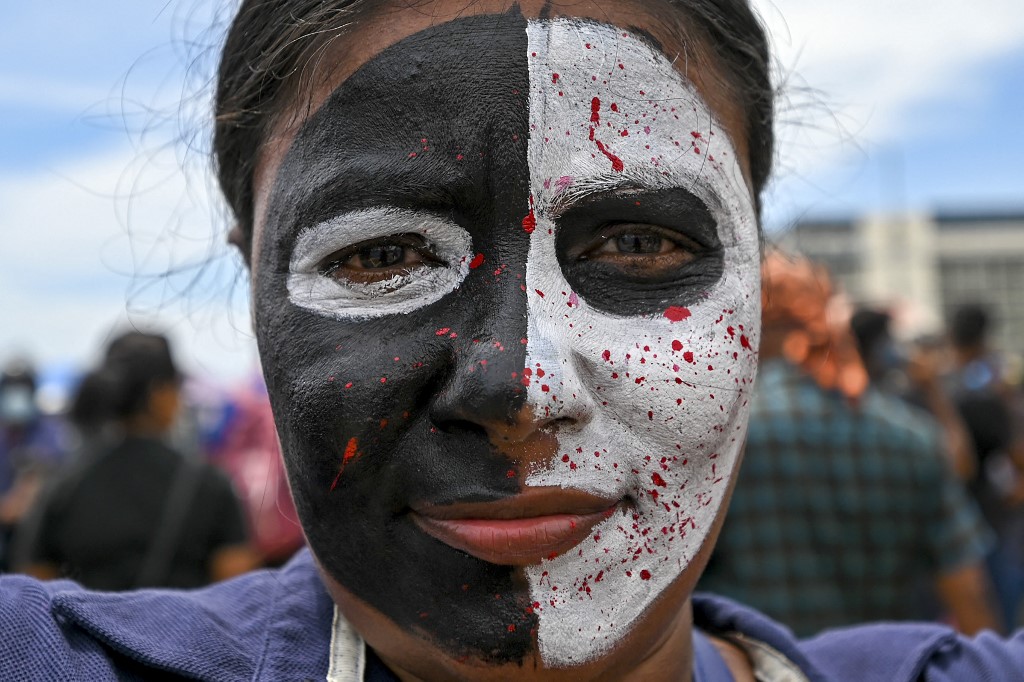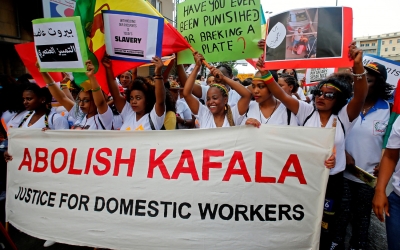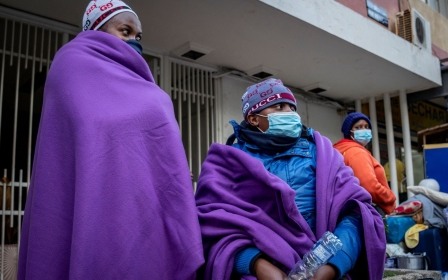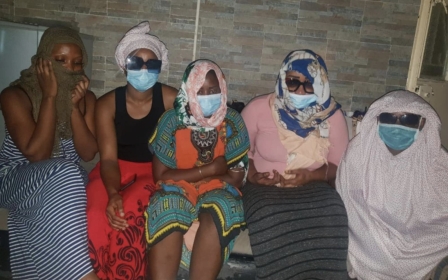Sri Lankan domestic workers in Lebanon caught between two crises

Anna sits on a plastic chair, wearing her blue overalls, in the car park of the apartment block where she lives and works.
It’s been a long day. She has finished cleaning her employer’s flat and she has just a moment to rest before moving on to one of her client’s houses. She unlocks her phone, and looks down at the blank screen, anxious for any news from home.
“My mother has Alzheimer’s, I have to send money home to pay someone to support her,” Anna tells Middle East Eye. “It is very difficult.”
'Nowadays, I make about $200 worth of lira that I can change for dollars. Before I would make around $800 per month'
- Anna, domestic worker in Lebanon
Anna, who is from Sri Lanka, works as a domestic housemaid in Lebanon.
New MEE newsletter: Jerusalem Dispatch
Sign up to get the latest insights and analysis on Israel-Palestine, alongside Turkey Unpacked and other MEE newsletters
She says she sends approximately half of what little money she makes home to support her ailing mother, who is cared for by a visiting nurse.
It’s a desperate situation, at a desperate time - both in Lebanon and Sri Lanka. For several weeks now, power cuts and severe shortages of food, fuel and medicine have caused misery in Sri Lanka, which is suffering its worst economic crisis in more than 70 years.
The cost of rice has doubled, and the price of bread has risen over 28 percent.
With severe electricity, fuel and medicine shortages, life for many Sri Lankans has become a daily struggle for survival.
Protests have erupted round the country, with people demanding the removal of a corrupt political class blamed for mismanaging the country’s finances.
Two countries in crisis
It’s a situation that is all too familiar for the people of Lebanon, who are in the midst of a continuing economic collapse.
“It's worse than in Lebanon,” Anna says of the situation in Sri Lanka. “My mum doesn't have gas to cook, so I sent $20 to buy the gas. They queued for 12 hours to buy just one cylinder.”
From nearly three and a half thousand miles away in Beirut, Anna has had to coordinate the provision of medicine and other necessities to support her mother.
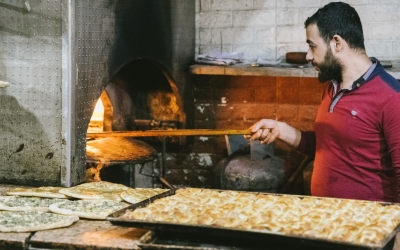
Due to power blackouts, she hasn’t had any direct contact with her in three weeks. Instead, she relies on updates from her friend, who goes round to check on her mother whenever she can.
It’s a hard life working in Lebanon as a housemaid, but over the last two years, as Lebanon’s economy has ground to a halt, the Lebanese lira has lost over 95 percent of its value. Living and working conditions for migrant workers like Anna have severely deteriorated as the value of their wages has plummeted.
“Nowadays, I make about $200 worth of lira that I can change for dollars. Before I would make maybe around $800 per month,” explains Anna.
Sri Lankan families have long relied on remittances sent home from workers like Anna. But the thousands of domestic workers still in Lebanon are now paralysed, caught between two economic catastrophes, no longer able to send any meaningful amount of money home.
“We don't have any choice, I cannot leave this country. If I went to Sri Lanka, I would not earn anywhere near $200.”
Three decades of hard work
Anna moved with her mother to Lebanon 30 years ago. Both women sought work as housemaids to support their family back at home.
In the beginning, Anna found this hard, and was making little more than $150 per month, barely enough to survive, let alone send money home to support her family. She was also mistreated and abused by her employers.
“Everywhere else they have rules to work eight hours per day, but not in this country. There are no medical services for migrant domestic workers and employers don't often treat you very well.”
Anna is one of the estimated 250,000 migrant workers - many undocumented - in Lebanon working under the infamous “kafala” system, a structure of laws and practices described by human rights organisations as modern-day slavery.
'I know of many domestic workers who have killed themselves'
- Anna, Sri Lankan domestic worker
These laws and practices restrict the rights of workers, binding their status in the country to their employers. Workers are also denied basic protections that others are entitled to under Lebanese labour law.
Cases of abuse and mistreatment are common. “I know of many domestic workers who have killed themselves,” Anna says.
In 2005, in a particularly shocking incident, a teenage Sri Lankan domestic worker hung herself from a balcony in the port city of Sidon. At the time, police said the 18-year-old had been in Lebanon for less than a month.
As Lebanon’s economic and financial crises have deteriorated, migrant domestic workers have borne the brunt of the fallout.
Workers have seen their wages withheld by their employers, who cannot afford to pay or repatriate them. Any savings they have been able to squirrel away have lost all value, and they have struggled to pay their rent and buy food.
Based on data from the Lebanese Ministry of Labour sent to MEE, the number of Sri Lankan workers has been in decline over the last decade.
As few as 3,267 Sri Lankan migrant domestic workers held work permits in Lebanon in 2021, down from approximately 5,346 in 2019 and from 14,856 in 2011. These figures include new and renewed work permits, but don’t represent those who may still be in the country with irregular status.
Unfortunately, many of the Sri Lankans who have returned, like Anna’s mother, have since found themselves in even worse circumstances, as Sri Lanka’s faltering economy has also collapsed.
In supporting her mother, Anna is reminded of her own vulnerability. She too now worries about getting old.
“I put all my money into food and education for my kids. One day I will probably leave without anything from this country,” she says.
Ageing domestic workers
The Sri Lankan workforce in Lebanon is one of the oldest and most ageing of all the migrant communities.
When employers started hiring housemaids from overseas in the 1970s and 1980s, Sri Lanka was one of the very first countries they looked to, as there was already a market for sending domestic workers to the Gulf countries.
Over time, demand for domestic workers started to increase, while at the same time the Sri Lankan government started making more demands for better protections for workers and higher wages.
“Recruitment agencies responded to the demand and started seeking out cheaper labour sources without any commitment to decent working conditions,” Zeina Mezher, from the International Labour Organisation (ILO), told MEE. The eyes of Lebanese employers shifted from Sri Lanka to Ethiopia and Bangladesh.
As a result, fewer Sri Lankans came to Lebanon, but many have chosen to remain, sending money home to their families. A significant number of these workers, though, have been unable to save money for themselves as they have grown older.
“Migrant domestic workers are not covered by social security. Their livelihood depends on their daily or monthly wages. But they can’t rely on a pension or health protection. When they stop working, a new struggle begins, especially at old age,“ said Mezher.
Just a few weeks ago, one of Anna’s friends, a leader in the Sri Lankan community, had a stroke and collapsed while working. She was in her 70s. The community, along with the help of an NGO, raised the funds to repatriate her to Sri Lanka.
“She also worked for over 30 years in Lebanon, most of her life she spent here. At the end of her life she left without anything,” says Anna.
No future
As the Sri Lankan workforce ages, this is likely to become an increasingly common issue. It’s a bleak outlook for without a social security net either in Lebanon or in Sri Lanka.
“The pandemic highlighted the significance of social protection for all workers. For migrant workers, this should be a commitment by both countries of destination and countries of origin, otherwise the vicious circle of vulnerability persists,” said Mezher.
'I dream of being in a nice home with my family. But, this will be only a dream for me'
- Anna, Sri Lankan domestic worker
The Sri Lankan community in Lebanon is a clear example of the price paid by these workers for lack of social protection. With both the Lebanese and Sri Lankan states in financial disarray, effective social security schemes for these workers are nowhere to be seen.
Having finished her education in Sri Lanka, Anna’s daughter has come to join her in Lebanon to work as a housemaid. Even with higher qualifications in pharmaceuticals and business, she has no employment options in Sri Lanka and has little choice but to follow in the hard-worn footsteps of her mother and grandmother.
When asked about the hopes she holds for her and her daughter’s future, the weight of 30 long years bears heavy on Anna’s answer.
“I would like to go to my country. I dream of being in a nice home with my family. But, this will be only a dream for me.”
Middle East Eye delivers independent and unrivalled coverage and analysis of the Middle East, North Africa and beyond. To learn more about republishing this content and the associated fees, please fill out this form. More about MEE can be found here.


